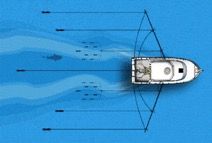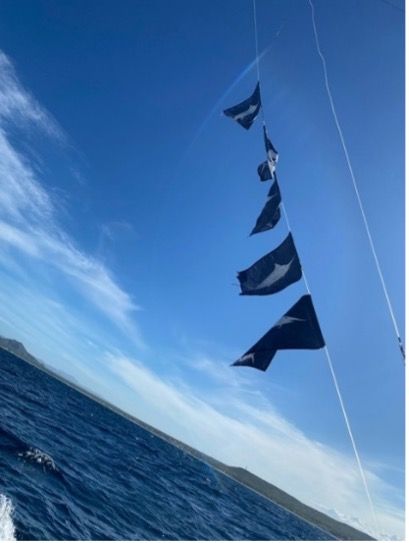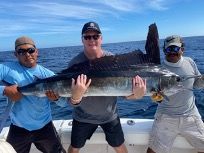Let me start by saying that I am not really a fisherman.
I
have been fishing a few times, but I need help and guidance whenever I go. I
tend to cause general confusion and get lines tangled. However, last week I had
the good fortune to go deep sea fishing in the Sea of Cortez, which is near
Cabo San Lucas, Mexico. I have been deep sea fishing before while on vacation
in Florida, but this was a whole new experience. The goal of fishing at this location
is not just to catch a fish, it's to catch marlins. Marlins are big. It is not that unusual for
someone to catch a 300+ pound fish! The world record is 1,560 pounds—the fish
was 14 feet 6 inches in length. In addition to going for much larger fish than
I am accustomed to, the seas were disturbed that day and we experienced 3-5-foot
rolling surf for about eight hours. Dramamine, please!

This lead-up is actually heading somewhere…
I was very impressed with the way an actual fishing boat
works, and I think there are some pretty interesting analogies in it to banking,
and to running a business in general. This is a diagram of how a typical boat
might be set up (there are variations, of course). The most impressive thing to
me was that on a modestly sized boat, we had 6-8 lines out all the time. As you
can see in the image, they use an outrigger system to spread the lines and
lures out over a much wider width than just the boat itself…more on that later.
Before we get into how this all works, let's consider for a moment that people going to Mexico to fish for marlin bring a broad range of experience. Many, like me, have very little experience. Others go down every year to enjoy the thrill of the catch. There is also often a language barrier between the crew and the participants. As I sat on the boat watching all the activity around me, I was really struck by the different roles of the crew, and how similar this all was to what we all do every day in capital markets, banking, and business.

The Captain
On our boat, we had a crew of three people taking care of us. The captain stood way up on top of the boat so he could get a look at the sea and direct the vessel's activities. His role was crucial. First and foremost, he drove the boat to the spots where he thought we could catch the most fish. Keep in mind that this is not necessarily an easy task. We were in the open sea, and fish move around every day. He needed to seek out, and find, opportunities for us to be successful. This reminded me so much of someone running a bank or business. He used his radio to contact other captains who were having success that day, but he also used his instincts and experience to find the best spots. We all need a strong and capable captain to put us in the right areas so we can achieve success. Imagine if you had a captain that just drove off into the middle of the sea and let you flounder all day. It wouldn't be very fun, and you probably would not get a lot of repeat business. The boats we crossed paths with signaled their success or failure by displaying flags upon their return to indicate how much they brought in that day. If you returned to port with no flags every day, people would start to notice.
The captain also had many other bigger picture items to focus on in our little world of the fishing boat. He determined speed, what kind of bait the crew would put out, and when we should change direction. He did not however get caught up in the very detailed world of setting the lines and baiting the hooks. That was left to the crew.
The Crew
I mentioned at the top that one of my foibles when fishing
is getting the lines tangled. It's the main reason that I don't really go on my
own. If I do, I spend most of my time untangling something. So, you can imagine
how important it is on a ship that has outriggers to keep things neat and tidy.
The two crew members who did this were amazing to me. As soon as a fish took
the bait, they would have to reel in every one of the other 6-7 lines, keep
everything untangled, and ensure the tourist fisherman (me!) did not screw up
and lose the fish. Sometimes a second fish would hit, and that would cause even
more chaos. They did this in a little six by eight-foot area that was wet and
sometimes had huge fishhooks all over the place (and yes, they were
barefoot!). Did I mention that the seas
were rolling with three to five-foot high waves? Once the fish was eventually
reeled in, they had to help pull it onto the boat and secure it. Marlins are not
particularly known as a great eating fish, so they would help the tourist pose
for a quick photo shoot with a squirming, fighting 200-pound ball of muscle,
and then throw it back in the water. Madness and chaos! If it was a good eating
fish (e.g., dorado) they would club it on the head and secure it in a locker on
deck. Meanwhile, way up top, the captain would try to keep the boat steady, and
in some cases, make course corrections if the fish went way off to the one side
or the other.
Here is the fact that really struck me though: The captain
stayed up on top. He did not come down and make sure the lines weren't tangled.
He trusted his crew. Did he offer advice and yell instruction, sure, but at the
end of the fight he was still standing up on the bridge.

My insight is not all that profound, but it did strike me. This
little ship was manned by only three people, but each of them knew his role,
and followed protocol. This resulted in success. If the captain failed, the
boat would not be successful, but at the same time, the crew needed to be great
as well.
Banking and business are often much more complicated than the little world of the fishing boat. I get it. As I sat there rolling along with the boat and watching the many lines heading leading out the stern I couldn't help thinking of a bank or credit union. We all need a clear-headed captain that can look out across business lines and see what's happening. We also need a captain that can change direction and try to "find the fish." It also really struck me that without the crew, the customer cannot have a great experience. The lines need to remain untangled, and we need to make sure that the bait gets changed. It's definitely not always glamorous down on the deck, but it's always very important. I'm stretching the analogy a little far, but since we are getting towards the end of the year, I think it's important to remember that without the crew that gets all the detailed work done, we still won't be successful—even if we know where the fish are located. Never forget that. We need both the captains and crew to have a successful business.
Since I have never caught a large fish before, and so you
don't think this is just a long fish tale, here is a picture of the fish I
caught. It was nearly 200 pounds! I simply have never done anything like this
before.
Final, final thought: They made ceviche with the fish we
caught just under three hours after we brought it in. It was mind blowing.
Fill out the form below to subscribe to my weekly blog.
The information, analysis, guidance and opinions expressed herein are for general and educational purposes only and are not intended to constitute legal, tax, securities or investment advice or a recommended course of action in any given situation. Information obtained from third party resources are believed to be reliable but not guaranteed. All opinions and views constitute our judgments as of the date of writing and are subject to change at any time without notice.


